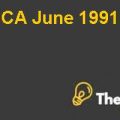Hotel Perennial
Introduction
Experiential Lodging Investments, LLC (EL Investments or ELI) is trying to invest in a distressed property of Hotel Perennial. Before entering into this deal, ELI must find if this deal is fit with the investment strategy of the Equity fund. Along with that, it must also find the right price to offer for the acquisition of this property.
ELI’s investment strategy
ELI’s investment strategy as stated by its vision was to create a real estate private equity firm that would “acquire, reposition, and develop highly sought-after resorts and hotels in major metropolitan areas and prestigious resort destinations”.
This strategy illustrates the previous as well as the upcoming acquisition and guides the equity fund into a proper direction. The investment strategy of ELI is clear that it wants to be restricted to resorts and hotels in the broad market of real estate. Hotels are classified as a different type of real estate and are counted as a real estate and a traditional operating business. For this purpose, ELI does not want to deviate to any other real estate type. Along with that, the strategy of ELI is extended to incorporate a broader level of operations by acquiring, repositioning and developing the hotels. Since the previous acquisitions by ELI have served different purposes like developing strategic relationship to provide accesses to hotel management team, was considered to be one of the finest hotels etc. thus; the strategy of ELI has always focused on hotel property in luxury segment. ELI also has an experience of dealing in distressed property. ELI prefers high risk high return investments to be well-received by high-net-worth investors.
Hotel Perennial Acquisition, Strategy Fit?
It is because of the fact that ELI has a vision for broader level of operations by acquiring, repositioning and developing the hotels. If the strategy is limited to any one of these operations, then Hotel Perennial Acquisition will not have been a strategic fit for ELI at all as this hotel needs all of these at the current moment because of its history in the market. Thus, Hotel Perennial acquisition seems to fit all the investment strategies of ELI apparently. However, the fact that this hotel is not luxurious and does not match with the prior acquisitions by ELI can be solved by the repositioning of this hotel as it is situated at a prime location.
Recommended Bid
The recommended bid is calculated according to the valuation of the company. There are different methods for the valuation of different businesses. The most widely used among them is the cap rate model in which the forward net operating income is divided by a cap rate. This valuation method is very simple and is mostly used but is not suitable at this stage. It is because the company’s cash flows were negative in the initial years according to the pro forma statement of the company. In this situation, the other method that is Precedent Transaction Analysis can be used for valuation and can be backed by the discounted cash flow method to be sure about the company’s valuated price.
There are other methods of valuation as well that include comparable companies analysis, LBO analysis, Ability-to-Pay (ATP) and STOP analysis which can be used.
The current Rolling 4 quarter average price per key as indicated by the exhibit 7 of the case is $110,000 while the number of rooms in this hotel is 194 only. Thus, value of the hotel is $21,340,000. The ELI will assume all the debts of Hotel Perennial and there will be additional cost for the acquisition as well. Thus, the ending value is found to be $12,064,756 through Precedent Transaction Analysis.
With the help of pro forma statement in the case, additional information in the case and the assumption of NPV and IRR along with the value of the company is calculated to be $12,924,400 through discounted cash flow analysis. The additional assumptions taken to reach this valuation price are the cap rate of 8.5%. Since in the recent historic times, the weighted average capitalization rate has remained between 8 and 9%, so an average of these percentages is used in the valuation of the terminal value of the company. The investors expect 20 to 30% return on their investment thus; for this value, an average percentage is taken to be 25%.
Both the values i.e. $12,064,756 through Precedent Transaction Analysis and $12,924,400 through discounted cash flow analysis are very close. The exact amount to be paid will be $12,064,756 because of the fact that this is a distressed property and that after the most recent buyer had fallen through, the banks’ valuation expectation may have fallen down. So the transaction will tend towards lower payment for this transaction by the company.Perennial Hotel Case Solution
The Projected Levered IRR for the Investment
With the cash flows that are calculated for Net present value calculation, the Unlevered IRR is calculated to be 18.9% whereas Levered IRR is calculated to be 25.0%.
Potential Opportunities and Challenges for ELI in the Acquisition of the Perennial
ELI can have potential opportunities in this deal. The initial fact is that the acquisition fits with the investment strategy of the equity fund. ELI can pursue its ultimate goal of acquiring, repositioning, and developing through this deal. The investors can profit from this deal. ELI can..........................
This is just a sample partial case solution. Please place the order on the website to order your own originally done case solution.
Hotel Perennial case puts students in the shoes of Dan Jameson, founder and CEO of a boutique real estate private equity firm called EL Investments (ELI), as he struggles with the decision or did not purchase Perennial Hotel, 194-room hotel on the north side of Chicago, Illinois. In making an investment decision, Jameson (and students) should consider various factors: What is the investment strategy of ELI, and what are the key competencies of the company? What are the goals for growing Jameson ELI, and how they can purchase Fit Hotel Perennial with these goals? What opportunities and challenges are ELI face if he decides to buy a hotel? No matter how much a buyer will likely have to pay for a hotel to achieve attractive long-term return? In addition to containing estimates of the hotel and simulation exercises, case Perennial hotel also provides students with several real estate industry concepts and terms, including with respect to the hotel industry, justice sources and unprofitable investment. Case material suggests that the students took the introductory course real estate finance or have relevant work experience. "Hide
by Denise Akason, Bill Bennett, Franco Famularo Source: Kellogg School Management 19 pages. Publication Date: March 1, 2011. Prod. #: KEL518-PDF-ENG













